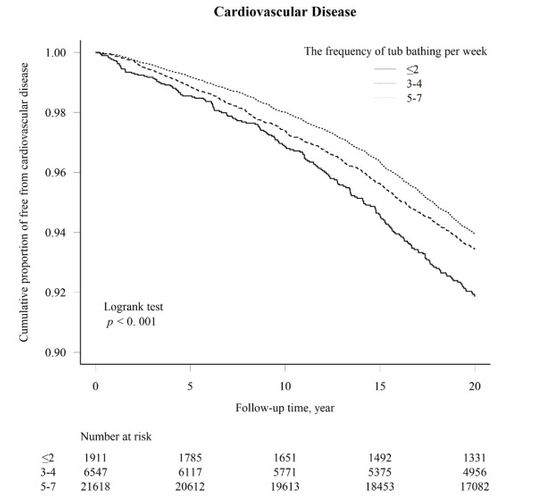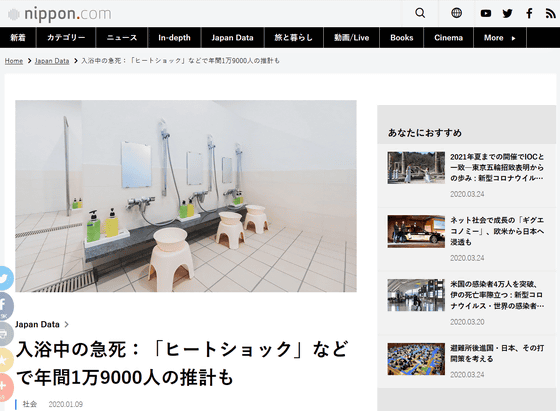Research results that taking a bath every day significantly reduces the risk of heart attack and stroke

On busy days, you can't take the time, and many people say that they can just take a shower instead of taking a bath. In contrast, joint research teams from the Osaka Institute of Health and Safety and Osaka University have published research results that show that taking a bath once a day significantly reduces the risk of cardiovascular disease . .
Habitual tub bathing and risks of incident coronary heart disease and stroke | Heart
Tub bathing and heart disease | Heart
https://heart.bmj.com/content/early/2020/03/03/heartjnl-2019-316187
Taking one hot bath a day lowers the risk of 3 deadly diseases — study
https://www.inverse.com/mind-body/taking-one-hot-bath-a-day-lowers-risk-of-3-deadly-diseases
In 2016, a research team at the University of Oregon also published a similar study that `` bathing reduces the risk of cardiovascular disease '', but the research published by the Japanese research team this time is the largest among related studies. It is a survey of the class. The research team followed up 30,76 subjects between the ages of 49 and 59 from five prefectures in Akita, Iwate and Nagano over a period of about 19 years from 1990 to 2009.
During the survey period, subjects were identified with 328 cases of coronary heart disease (275 myocardial infarction, 53 sudden cardiac deaths ), 1769 strokes (991 cerebral infarction, 510 intracerebral hemorrhage, subarachnoid hemorrhage 255 and 13 others). In total, 2097 cardiovascular diseases were found.
The researchers classified each subject according to 'bathing frequency' obtained from the interview survey. The subjects are divided into three stages of “0 to 2 days”, “3 to 4 times”, and “5 to 7 days”, and the “survival rate” of subjects belonging to each category during the survey period Was examined. Note that “bathing” here means “to take a bath” and does not include “to take a shower”.
Below is a graph showing the cumulative survival rate of subjects in each category. The horizontal axis is the period (unit is years), and the vertical axis is the survival rate. The survival rate is closer to 1.00, indicating higher survival (less death from cardiovascular disease). At 20 years, the survival rate for subjects with a bathing frequency of 3-4 days or 5-7 days per week is around 0.94, while for those with a low frequency of bathing, the survival rate has reached 0.92 at the end of 20 years. . Comparing subjects bathing daily with subjects bathing only 0-2 days a week, subjects bathing daily have a 28% lower risk of cardiovascular disease and a 26% lower risk of stroke.

The research team is also investigating the temperature of hot water. The subjects asked whether the temperature of the hot water that they usually enter was “warm,” “normal,” or “hot,” and the research team compared the results with the incidence of cardiovascular disease. As a result, no significant difference was found. The research team wrote, 'Further research is needed on water temperature.'
The research team acknowledges that there are some issues with this study. First, the subject's 'bathing frequency' was determined at the start of the study, and changing the bathing frequency during the long 19-year study period was not reflected in the results. Second, subjects with a high frequency of bathing have many white-collar workers (non-manual workers), and subjects with low frequency of bathing have many blue-collar workers (manual workers). That economic and economic conditions may have affected the results. Third, in this survey, we did not look at 'why bathing is so infrequent'. Regarding the third issue, the team noted that 'something is reducing the frequency of bathing, which may be affecting cardiovascular disease.'

The researchers concluded that the study suggests that regular bathing is associated with a lower risk of cardiovascular disease among middle-aged Japanese, suggesting that bathing may be effective in preventing cardiovascular disease '
Andrew Felix Baden of the University of Exeter , UK, pointed out that the frequency of bathing is based on a questionnaire survey and may not reflect the actual situation, as the research team acknowledged. In addition, since the subjects were limited to Japanese people, `` Japanese people tend to soak in hot water to their shoulders, so the effect on cardiovascular disease may be 'water pressure', '' he said. A study from the University of Western Australia in 2014 showed that applying pressure to the right ventricle in a tank caused a cardiovascular response.
Baden noted that bathing hot water can be dangerous for elderly people, and points out that bathing has some negative aspects. The Consumer Affairs Agency estimates that nearly 19,000 people die annually due to the ' heat shock phenomenon ' that causes blood pressure to fluctuate and pulse to fluctuate due to rapid temperature changes, which leads to death.
Sudden death during bathing: 19,000 estimated annually for 'heat shock' | nippon.com
https://www.nippon.com/ja/japan-data/h00623/

Related Posts:
in Science, Posted by darkhorse_log







